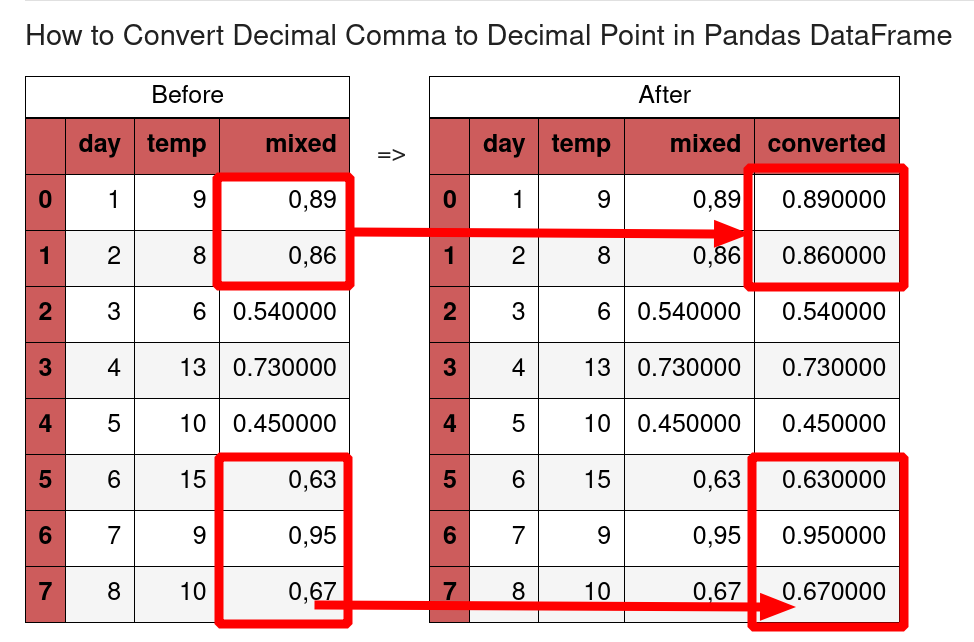In this quick tutorial, we're going to convert decimal comma to decimal point in Pandas DataFrame and vice versa. It will also show how to remove decimals from strings in Pandas columns.
Different people in the world are using different decimal separator like:
- decimal point - more often
- decimal comma - in the Francophone area
Setup
Let's work with the following DataFrame:
import pandas as pd
df = pd.DataFrame(data={'day': [1, 2, 3, 4, 5, 6, 7, 8],
'temp': [9, 8, 6, 13, 10, 15, 9, 10],
'humidity': [0.89, 0.86, 0.54, 0.73, 0.45, 0.63, 0.95, 0.67],
'humidity_eu': ['0,89', '0,86', '0,54', '0,73', '0,45', '0,63', '0,95', '0,67']})
We have two columns with float data:
- decimal comma
- decimal point
| day | temp | humidity | humidity_eu | |
|---|---|---|---|---|
| 0 | 1 | 9 | 0.89 | 0,89 |
| 1 | 2 | 8 | 0.86 | 0,86 |
| 2 | 3 | 6 | 0.54 | 0,54 |
| 3 | 4 | 13 | 0.73 | 0,73 |
| 4 | 5 | 10 | 0.45 | 0,45 |
1: read_csv - decimal point vs comma
Let's start with the optimal solution - convert decimal comma to decimal point while reading CSV file in Pandas.
Method read_csv() has parameter three parameters that can help:
decimal- the decimal sign used in the CSV filedelimiter- separator for the CSV file (tab, semi-colon etc)thousands- what is the symbol for thousands - if any
To use them we can do:
df = pd.read_csv('file.csv', delimiter=";", decimal=",", thousands="`")
This will ensure that the correct decimal symbol is used for the DataFrame.
2: Convert comma to point
If the DataFrame contains values with comma then we can convert them by .str.replace():
df['humidity_eu'].str.replace(',', '.').astype(float)
result is:
0 0.89
1 0.86
2 0.54
3 0.73
4 0.45
5 0.63
6 0.95
7 0.67
Name: humidity_eu, dtype: float64
3: Mixed decimal data - point and comma
What can we do in case of mixed data in a given column? For this example we can use: list comprehensions and pd.to_numeric().
This can help us to identify the problematic values and keep the rest the same.
For example we can do:
s = pd.Series(['0,89', '0,86', 0.54, 0.73, 0.45, '0,63', '0,95', '0,67'])
mix = [x.replace(',', '.') if type(x) == str else x for x in s]
to replace the comma in all string records:
['0.89', '0.86', 0.54, 0.73, 0.45, '0.63', '0.95', '0.67']
Then we can convert the Series by:
pd.to_numeric(mix)
array([0.89, 0.86, 0.54, 0.73, 0.45, 0.63, 0.95, 0.67])
4: Detect decimal comma in mixed column
To detect which are the problematic values we can use:
s[pd.to_numeric(s, errors='coerce').isna() ]
the result of to_numeric is:
array([ nan, nan, 0.54, 0.73, 0.45, nan, nan, nan])
while the final result is showing all values with decimal comma:
0 0,89
1 0,86
5 0,63
6 0,95
7 0,67
dtype: object
5: to_csv - decimal point vs comma
Finally if we like to write CSV file by method to_csv we can use parameters:
decimalsep
to control the decimal symbol.
To convert CSV values from decimal comma to decimal point with Python and Pandas we can do :
df = pd.read_csv("file.csv", decimal=",")
df.to_csv("test2.csv", sep=',', decimal='.')

ValueError: could not convert string to float: '0,89'
The error: "ValueError: could not convert string to float: '0,89'" is raised when we try to parse decimal comma to float.
The error is given by method s.astype(float):
s = pd.Series(['0,89', '0,86', 0.54, 0.73, 0.45, '0,63', '0,95', '0,67'])
s.astype(float)
ValueError: Unable to parse string "0,89" at position 0
The error is the result of the pd.to_numeric(s) method - when a decimal comma is present in the input values.
s = pd.Series(['0,89', '0,86', 0.54, 0.73, 0.45, '0,63', '0,95', '0,67'])
pd.to_numeric(s)
result:
ValueError: Unable to parse string "0,89" at position 0
Conclusion
In this article we saw how to replace, change and convert decimal symbols in Pandas. We saw how to detect problematic values in mixed columns - which have decimal commas and points simultaneously.
Typical errors were explained.
For further reference you can check also:









